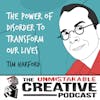Best of 2021: Tim Harford | The Power of Disorder to Transform Our Lives

Tim Harford introduces us to the messy world around us with an insightful new perspective. Tim explains that gifts of character like creativity, responsiveness and resilience are not found without the disorder, confusion, and disarray to produce them. ...
Tim Harford introduces us to the messy world around us with an insightful new perspective. Tim explains that gifts of character like creativity, responsiveness and resilience are not found without the disorder, confusion, and disarray to produce them. Discover the wonder of mess and the unexpected connection it has with creativity.
Subscribe for ad-free interviews and bonus episodes https://plus.acast.com/s/the-unmistakable-creative-podcast.
Hosted on Acast. See acast.com/privacy for more information.
Candid Conversations: Elevate Your Thinking with Masters of Their Craft
Dive into a realm of transformative conversations, where wisdom from trailblazers who've shattered norms is at your fingertips. Learn from best-selling authors who've decoded productivity, and thought leaders who've sculpted the landscape of personal and professional growth. Unearth the secrets of successful entrepreneurs, delve into the science of habits, and explore the art of charisma. Each conversation is a journey, brimming with unexpected insights and practical wisdom that will ignite you











